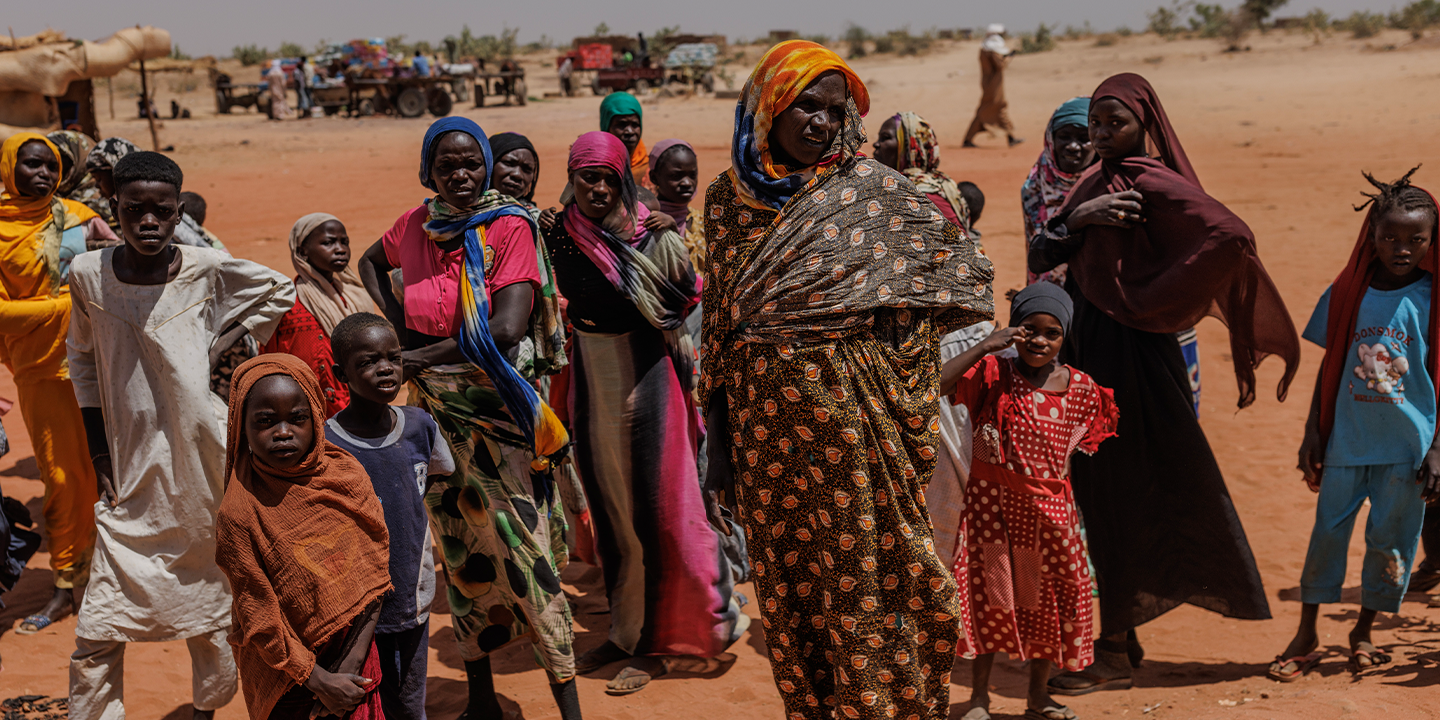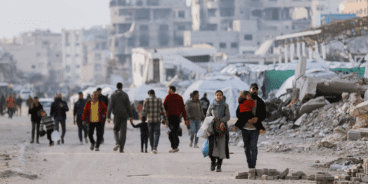

Atrocity Alert No. 396: Sudan, Myanmar (Burma) and Israel and the Occupied Palestinian Territory
Atrocity Alert is a weekly publication by the Global Centre for the Responsibility to Protect highlighting situations where populations are at risk of, or are enduring, mass atrocity crimes.
CIVILIANS AT GRAVE RISK AS VIOLENCE ESCALATES IN EL FASHER, SUDAN
Violence has drastically escalated in El Fasher, North Darfur, between the Sudanese Armed Forces (SAF) and the Rapid Support Forces (RSF), with a devastating toll on civilians. The escalation follows multiple warnings of an imminent attack on El Fasher, the only capital in Darfur not controlled by the RSF. In a report published on 16 May, the Humanitarian Research Lab (HRL) at the Yale School of Public Health confirmed significant conflict-related damage in the eastern and southeastern neighborhoods of El Fasher, as well as in the rural northeastern section, concluding that 87 percent of the damage in El Fasher from March to May occurred between 9-14 May alone. According to the HRL, “The direct, sustained ground fighting and attacks on civilian neighborhoods and critical infrastructure…represent a new stage in the battle for El-Fasher with increased civilian casualties and displacement.”
While hospitals in the region are largely inoperable, El Fasher’s South Hospital, supported by Médecins Sans Frontières (MSF), reported at least 454 casualties between 10-15 May. According to MSF, at least 56 people succumbed to their injuries, although the actual figure of those wounded and killed is likely much higher since the intense fighting has prevented people from reaching the hospital. On 15 May Clementine Nkweta-Salami, UN Resident and Humanitarian Coordinator for Sudan, stressed, “the fighting in El Fasher is another tragic example of this conflict’s grotesque impact on civilians” and warned that the escalating hostilities is “putting an entire city in peril.”
The RSF has utilized the conflict to launch a systematic campaign of ethnic cleansing and large-scale attacks targeting non-Arab communities, possibly amounting to the crime of genocide. In a report dated 9 May, Human Rights Watch described the waves of attacks as part of a systematic campaign of ethnic cleansing that resulted in the killing of thousands of people in El Geneina, West Darfur, between April and November 2023. Civilians in El Fasher are currently facing similar atrocity risks. During the UN Security Council’s (UNSC) Open Debate on the Protection of Civilians in Armed Conflict on 21 May, Alice Nderitu, UN Special Adviser on the Prevention of Genocide, warned that the situation in Darfur “bears all the marks of risks of genocide, with strong allegations that this crime is already been committed.”
Despite the imminent risk facing populations in El Fasher, amid the overwhelming and convincing evidence of potential war crimes and crimes against humanity perpetrated by the SAF and RSF since April 2023, the world is hesitating to respond. The international community should continue to support efforts aimed at ending the fighting between the SAF and RSF, while also assessing the risk of mass atrocities and urgently responding to avoid further deterioration in Darfur. All member states must uphold the arms embargo imposed by the UNSC in Darfur and refrain from providing military supplies to the warring parties.
BUTHIDAUNG BURNS AS ETHNIC TENSIONS ESCALATE IN RAKHINE STATE, MYANMAR
Beginning on 17 May the Arakan Army (AA), a Rakhine ethnic resistance organization (ERO), advanced on Buthidaung in Myanmar’s (Burma) Rakhine State, putting the town’s predominantly Muslim ethnic Rohingya population at heightened risk. The AA gave residents less than 24 hours to evacuate, but before the deadline passed Buthidaung was already on fire. Satellite imagery analysis by the Australian Strategic Policy Institute shows widespread fires and destruction of urban areas and homes with surrounding areas untouched, indicative of an on-the-ground arson campaign. Rohingya activists and witnesses allege that the AA was responsible for the arson and forced displacement, while the AA blamed the fires on airstrikes by Myanmar’s military. According to initial reports, at least 30 people have been killed and over 200,000 newly displaced with nowhere safe to shelter. Rohingya activists reported that the AA has attacked areas where Rohingya had sought shelter, including a school and hospital.
Violence in Rakhine State has sharply escalated since EROs across Myanmar launched Operation 1027 against the military. A year-long informal ceasefire between the military junta and the AA ended on 13 November when the group launched attacks. Following significant losses to EROs, the military junta has targeted Rohingya in its forced conscription campaigns. Recent reports have alleged that the junta is using Rohingya conscripts to set fire to homes in Rakhine, seemingly with the aim to inflame ethnic tensions.
On 20 May the UN High Commissioner for Human Rights raised alarm, stating, “with inter-communal tensions between ethnic Rakhine and Rohingya high – and being actively stoked by the military – this is a critical period when the risk of yet further atrocity crimes is particularly acute.” Meanwhile, the Special Advisory Council for Myanmar – comprised of three former UN experts on Myanmar – warned, “The Rohingya people in western Myanmar are again at risk of genocide… The [AA] has been one of the most effective armed groups opposing the vicious Myanmar military…now, however, it seems to be turning its guns on the defenseless Rohingya people to complete the genocide undertaken by the same military it has opposed.”
The reported targeting of the Rohingya in the renewed violence, coupled with the resurgence in tensions, warrants an immediate, robust response. The UN Security Council should urgently meet on the situation in Myanmar and, with a unified voice, condemn the ongoing violence and call upon the military, the AA and other EROs to cease indiscriminately attacking civilian areas in Rakhine State and elsewhere and urgently take steps to deescalate current tensions. The AA and military must cease causing harm to the Rohingya and other civilians, as well as refrain from targeting and destroying protected civilian infrastructure.
ICC PROSECUTOR REQUESTS ARREST WARRANTS FOR ISRAELI OFFICIALS AND HAMAS LEADERS
On 20 May Chief Prosecutor of the International Criminal Court (ICC) Karim Khan announced the filing of applications for arrest warrants related to the situation in Palestine. Prosecutor Khan said he has reasonable grounds to believe that three Hamas officials and two Israeli government officials bear criminal responsibility for war crimes and crimes against humanity. Prosecutor Khan said, “International law and the laws of armed conflict apply to all. No foot soldier, no commander, no civilian leader – no one – can act with impunity.” The Pre-Trial Chamber will decide whether the evidence is sufficient to confirm the charges and issue arrest warrants.
Prosecutor Khan charged Yahya Sinwar, Head of Hamas in the Gaza Strip, Mohammed Diab Ibrahim Al-Masri, Commander-in-Chief of the military wing of Hamas also known as the Al-Qassam Brigades, and Ismail Haniyeh, Head of Hamas Political Bureau, for the following crimes from at least 7 October 2023: extermination, murder, taking hostages, rape and other acts of sexual violence, torture and other inhumane acts, cruel treatment and outrages upon personal dignity. There are also reasonable grounds to believe that hostages taken from Israel have been kept in inhumane conditions, with some subjected to sexual violence.
The charges brought against Benjamin Netanyahu, Prime Minister of Israel, and Yoav Gallant, Minister of Defence of Israel, from at least 8 October onwards, include starvation of civilians as a method of warfare, intentionally directing attacks against a civilian population, extermination and/or murder, including in the context of deaths caused by starvation and persecution, among other crimes. The Prosecutor specified that Israel’s total siege of Gaza, arbitrary restrictions on essential supplies, attacks on civilians queuing for food, obstruction of aid delivery and the killing of aid workers were all part of “a common plan to use starvation as a method of war and other acts of violence against the Gazan civilian population as a means to…collectively punish the civilian population of Gaza, whom they perceived as a threat to Israel.” The Prosecutor stressed that Israel’s means of warfare in Gaza are criminal.
Over 810,000 people have been forced to flee Rafah since Israeli forces intensified military operations on 6 May, amplifying risks of further atrocity crimes. In the context of ongoing proceedings before the International Court of Justice (ICJ) against Israel for alleged violations of the Genocide Convention, the ICJ held public hearings on 16 and 17 May following South Africa’s urgent request for the indication of additional provisional measures and the modification of the ICJ’s prior provisional measures order given the ongoing developments.
Prosecutor Khan’s announcement of his decision to apply for arrest warrants is a necessary and welcome step toward ending impunity for perpetrators of atrocity crimes in Israel and Gaza. The ICC must be allowed to conduct its mandate with independence and impartiality. Every state, regardless of whether they are a State Party to the Rome Statute, should respect the ICC and cease all impediments, intimidation, retaliation or improper influences against the Court and its officials.
Related Content


Atrocity Alert No. 433: Israel and the Occupied Palestinian Territory, Myanmar (Burma) and Mali
